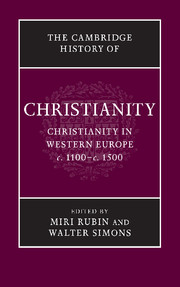Book contents
- Frontmatter
- Introduction
- PART I INSTITUTIONS AND CHANGE: 1100–1200
- PART II FORGING A CHRISTIAN WORLD, 1200–1300
- PART III THE ERECTION OF BOUNDARIES
- PART IV SHAPES OF A CHRISTIAN WORLD
- PART V CHRISTIAN LIFE IN MOVEMENT
- PART VI THE CHALLENGES TO A CHRISTIAN SOCIETY
- PART VII REFORM AND RENEWAL
- 26 Empowerment through reading, writing and example: the Devotio moderna
- 27 Demons and the Christian community
- 28 Wycliffism and Lollardy
- 29 Observant reform in religious orders
- 30 Public purity and discipline: states and religious renewal
- 31 The Bible in the fifteenth century
- Select bibliography
- Index
- Map 1 Western Europe c. 1100 – c. 1500
- Map 2 Universities of Europe
- References
27 - Demons and the Christian community
from PART VII - REFORM AND RENEWAL
Published online by Cambridge University Press: 28 March 2010
- Frontmatter
- Introduction
- PART I INSTITUTIONS AND CHANGE: 1100–1200
- PART II FORGING A CHRISTIAN WORLD, 1200–1300
- PART III THE ERECTION OF BOUNDARIES
- PART IV SHAPES OF A CHRISTIAN WORLD
- PART V CHRISTIAN LIFE IN MOVEMENT
- PART VI THE CHALLENGES TO A CHRISTIAN SOCIETY
- PART VII REFORM AND RENEWAL
- 26 Empowerment through reading, writing and example: the Devotio moderna
- 27 Demons and the Christian community
- 28 Wycliffism and Lollardy
- 29 Observant reform in religious orders
- 30 Public purity and discipline: states and religious renewal
- 31 The Bible in the fifteenth century
- Select bibliography
- Index
- Map 1 Western Europe c. 1100 – c. 1500
- Map 2 Universities of Europe
- References
Summary
The anxiety over Satan, which led, in a reciprocal relationship of cause and effect, to the relentless persecution of devil-worshippers and acolytes, took hold fully half-way through the Middle Ages. Christianity had always been conscious of the devil’s presence; the earliest descriptions, found in both Genesis and the New Testament passage on Christ in the wilderness, portray him as seducer and tempter. The devil was the Enemy, the Foe, surrounded by demons, acolytes and other followers. The creation of the evil court, which stood in opposition to the celestial, was well known: a group of angels followed Satan in his fall and then continued to serve him. A basic dualism opposed the temptations of the flesh, ambition or despair (as with Job before his ultimate resistance) with the appeal for the love of God, compassion and hope. This dualism was dominated by the figure of Christ incarnate, unswerving and triumphant opponent of the devil and his eternal pursuance of evil works. From mid-way through the Middle Ages, devotions to Christ focused attention on the fight against demons; endeavours to imitate Jesus implied constant struggle, yet this was nothing compared with the difficulty and inequality of Christ’s own battle. The extent of the evil to be confronted was such that it probably sparked the ‘Cathar’ heresies which appeared in the twelfth century – too easily viewed as simply one ancient and far-off error, imported and disseminated.
Keywords
- Type
- Chapter
- Information
- The Cambridge History of Christianity , pp. 420 - 432Publisher: Cambridge University PressPrint publication year: 2009



